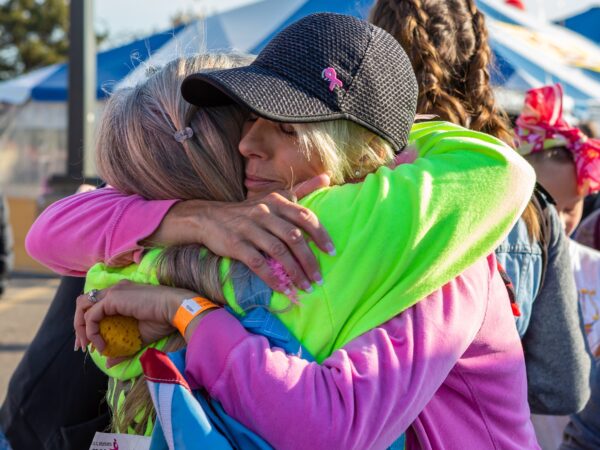Congratulations. You’ve made it through some of the worst days of your life, beginning with “You have cancer.”
You’ve been through a full course of radiation therapy.
You’ve joined the millions of Americans whose lives we celebrate on June 4, National Cancer Survivor’s Day.
But where do you go from here?
The answer depends on your overall health, the type of cancer you have, and the treatment you receive. For some people, completing radiation treatment means easing back into normal everyday life. For others, whose treatment plan includes surgery or chemotherapy, the road back to normal is longer and more winding. For still others, it may mean finding a new normal.
People who have gone through cancer treatment often describe the first few months in terms of change. Things may seem different to you. Your perspective on life may have changed. No wonder.
Your body has been through a battle.
Besides the trauma that cancer inflicts on your body, the radiation treatment itself can exact a toll on you. The type of side effects you might have depends on your specific prescribed radiation dose and schedule. Most side effects go away after a few months, but some may continue as your body builds healthy cells to recover from radiation.
Early side effects happen during or shortly after treatment. These tend to be short-term, mild, and treatable. They’re usually gone within a few weeks after treatment ends. The most common early side effects are skin changes and fatigue.
Your skin in the radiation treatment area might look red, irritated, swollen, blistered, sunburned, or tanned. It might become dry, flaky, or itchy, or it may peel. It’s important to let your MRO care team know about any skin changes. They can suggest ways to ease the discomfort, lessen further irritation, and prevent infection. Radiation can also cause hair loss or thinning, but only in the area being treated.
Fatigue is personal. No lab tests or x-rays can diagnose or describe what you feel. The best measure of fatigue comes from your own report to your MRO care team. You may find that you still need extra rest while your healthy tissues are rebuilding. Take naps as needed and try to get more sleep at night. You may need some time to rebuild your strength, little by little, so it might be a good idea to resume activities partially rather than going for a full schedule right away.
Late side effects can take months or even years to develop. They can occur in any normal tissue in the body that has received radiation. The risk of late side effects depends on the area treated as well as the radiation dose that was used. Careful treatment planning helps to avoid serious long-term side effects. It’s always best to talk to your MRO care team about the risk of long-term side effects.
Some patients need help managing pain that can result at the treatment site after radiation therapy. Over-the-counter pain medicine may be enough, but if you have severe pain, ask your MRO care team about prescription drugs or other methods of relief.
After treatment for cancer, you’re likely to be more aware of how your body feels. If you notice any unusual symptoms, be sure to discuss them with your MRO care team. These include:
- Pain that doesn’t go away
- Lumps, bumps, or swelling
- Nausea, vomiting, diarrhea or loss of appetite
- Weight loss
- A fever or cough that doesn’t go away
- Unusual rashes, bruises or bleeding
Tell your MRO care team about any side effects you notice so they can help you with them.
The mental game
A cancer diagnosis is a ticket to ride on an emotional rollercoaster, and life after cancer treatment can present its own mental challenges. You may have mixed feelings when treatment ends, and worry that every ache and pain mean the cancer is coming back.
Some people say that they feel pressure to return to “normal life”. But it’s important to allow yourself time to adjust to the emotional changes and establish a new daily routine at your own pace.
This is the time to lean on your support network of family and friends. And you may want spiritual or psychological guidance as well. If you need to take time off from work, talk to your employer.
It’s perfectly normal to have a dark day now and then, but if you have continued feelings of sadness, have trouble getting up in the morning, or lose motivation to do things that previously gave you pleasure, you may be experiencing depression. It’s not uncommon among cancer survivors. Talk to your MRO care team or your regular doctor. Counselling or medication – even for a short time – may help.
Finally…
No matter what type of cancer you’ve had, you’ll need regular checkups to determine how successful the treatment was and if you need additional therapy. Here are some questions to keep in mind:
- How often will I need to return for check-ups?
- Why do I need more X-rays, scans or blood tests?
- Will I need chemotherapy, surgery, or other treatments?
- How will I know if I’m cured of cancer?
- What are the chances that it will come back?
- How soon can I go to work and engage in sports or sexual activity?
- Do I need a special diet?
- Can I wear a prosthesis?
- If needed, how soon can I have reconstructive surgery?
Ask your MRO care team about these and any other questions you may have. Remember that the survivor’s journey happens one day at a time. Bon voyage!


